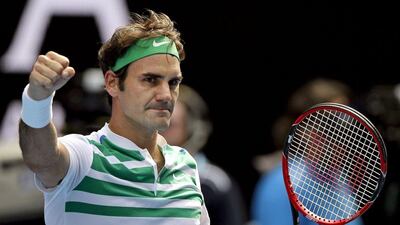Sportsmen reach that point in time when they know they must leave in different ways. When he retired from international cricket in 1995, Graham Gooch seemed almost offended by the fact of what he had become.
“I set certain standards for myself and I’ve not been attaining the level of performance I want,” he said ahead of his last Test in 1995. Two and a half years later the Englishman retired from the first-class cricket, a sprightly 44.
Gooch’s commitment to keeping fit was ferocious but that season again he seemed worried by what he was becoming.
Read more:
Novak Djokovic sets-up Roger Federer Australian Open showdown: ‘It will be a great match’
Roger Federer says Tomas Berdych ‘makes you play better’ as he advances to semi-finals
“It’s not that I’ve been playing badly, but scoring 20s, 30s, 40s and 50s has never been in my game plan.” And then: “I’ve too much respect for what I’ve achieved to just hang on.”
Only the desire to build a cancer hospital to provide treatment to the underprivileged in Pakistan kept Imran Khan going for the last five years of his career. His shoulder was a mess, the body was spent but driving him was a will shaped to focus on a single challenge.
Once he had won the World Cup in 1992, a feat he thought would go a long way towards building the hospital, he was done. He was tempted to change his mind when he realised that fundraising never ends, but he did not.
Andre Agassi left tennis in 2006, when there was nothing left inside him.
When he woke up, at age 36, a few days before his last match, he felt like he was 96. He was sleeping on the floor because it was better for his back. His children stopped themselves from jumping on him because they knew he might “shatter if they touch him too hard”.
The spur for Jahangir Khan’s retirement from squash in 1993 was a mixture of pain and pride. Injuries had piled up and his great strength, his stamina, was being undermined. At his peak, he would start his day with a 10-mile run, have a light breakfast and be off on the courts.
A lunch break was followed by gym sessions, occasionally swimming and then an evening full of more court work. Six days a week, most weeks a year.
“I find it very difficult to keep up the training,” he said after he announced his retirement. “I don’t want to risk losing in the first round and it’s better to retire before that happens.”
All of which brings us to Roger Federer, who Thursday takes on Novak Djokovic in the semi-finals of the Australian Open. He may not beat him – Djokovic has won five of their last six matches at grand slams, including the last three – and that will not be a surprise. It will be a greater surprise if he does beat him, for Djokovic is the pre-eminent force in men's tennis now.
But it is Federer who has been a far more intriguing attraction over the last year, almost as if he is playing on his own separate, private tour. At 34 he is supposed to be on his way out and yet, neither is he suggesting any such thing, nor is he playing as if he is. In fact, after winning in Basel last November, he hinted at being around till 2018.
Poll: Roger Federer or Novak Djokovic? Who wins?
No specific goal is driving him on. Of course he wants to win more majors, but, presumably, it is not something that burns inside him. How could it when he is out there alone, on top in terms of majors won?
Does it prick his pride when he does not add to that collection, that he may not be attaining that level of performance that he is used to? It hardly seems so, as on his tour right now, small things such as losing in big finals do not matter the way to him that they once did.
This, then, is a hitherto unseen way of a sporting exit, disorientating because of its uncomplicatedness. Federer has one major win in nearly six years now so he is no longer a serial winner. But he is still playing at a level where there is, realistically, only one player better than him.
So why, we ask, is he still going? When there is no target, athletes leave. When there is a fear that their legacy might fade, they leave. When they are tired they leave.
Federer plays on. He plays on, as he often says but we do not take seriously enough, because he is having fun, that he is playing tennis purely for the sake of tennis. And that is what is disorientating: we are just not used to professional sport being this way.
Follow us on Twitter @NatSportUAE
Like us on Facebook at facebook.com/TheNationalSport

